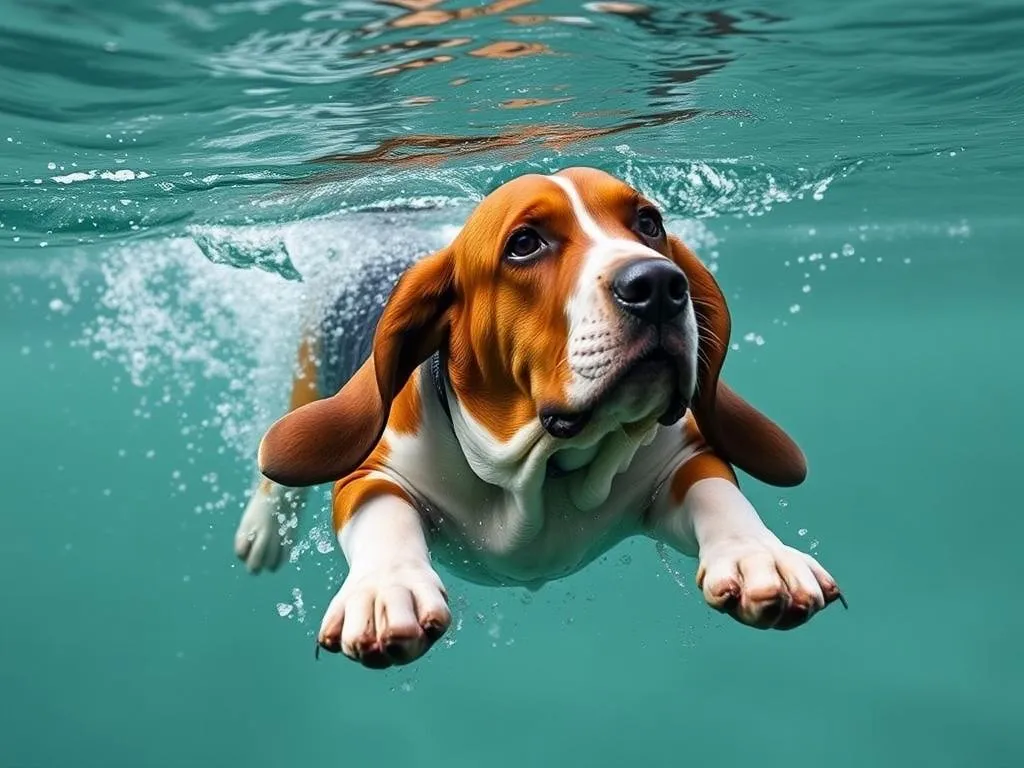
Introduction
Dog health care is essential for ensuring our furry companions lead long, happy, and active lives. Among the various breeds, Basset Hounds are unique, known for their droopy ears and short legs. Their distinct appearance and temperament raise questions about their physical capabilities, especially when it comes to activities like swimming. This article explores how well a Basset Hound can swim and addresses the overall health implications associated with this activity.
Understanding Basset Hounds
Breed Characteristics
Basset Hounds are medium-sized dogs, typically weighing between 40 to 65 pounds and standing about 14 to 15 inches tall at the shoulder. Their long, muscular bodies, characterized by a large head and droopy ears, give them a unique look. The short, stocky legs contribute to their distinctive gait, while their coat is usually short and can come in various colors, including tri-color, lemon, and red and white.
In terms of temperament, Basset Hounds are known for being gentle and friendly. They are often described as affectionate, good-natured, and laid-back, making them great family pets. However, their stubbornness can sometimes pose challenges during training sessions.
Common Health Concerns
Like all breeds, Basset Hounds are prone to specific health issues. Genetic predispositions include:
- Hip Dysplasia: A common concern in many dog breeds, hip dysplasia can lead to arthritis and mobility issues.
- Ear Infections: Due to their long ears, Basset Hounds are more susceptible to ear infections, necessitating regular cleaning and veterinary check-ups.
Regular veterinary care is crucial for identifying and addressing any health concerns early on. Routine check-ups can help spot potential issues before they become serious.
Swimming as Exercise for Dogs
Benefits of Swimming for Dogs
Swimming is a fantastic form of exercise for dogs, offering numerous health benefits:
- Cardiovascular Health: Swimming helps improve heart health by providing an excellent aerobic workout.
- Joint Support and Low-Impact Exercise: The buoyancy of water supports the dog’s weight, reducing strain on joints and making it an ideal exercise for dogs with arthritis or other mobility issues.
Swimming Safety Tips for Dogs
While swimming is beneficial, safety should always be a priority. Here are some essential tips:
- Supervision: Always supervise your dog while swimming to ensure their safety.
- Recognizing Signs of Fatigue or Distress: Learn to recognize when your dog is tired or struggling in the water. Signs include heavy panting, erratic swimming, or an inability to keep their head above water.
Basset Hounds and Swimming
Can Basset Hounds Swim?
When it comes to how well a Basset Hound can swim, the answer is somewhat nuanced. While Basset Hounds can swim, they are not natural swimmers like some breeds, such as Labradors or Golden Retrievers. Their short legs and long bodies create a unique challenge in the water, making their swimming technique less efficient.
Physical Limitations
Basset Hounds’ physical structure presents certain limitations:
- Short Legs and Body Structure: Their short legs may hinder their ability to paddle effectively, which can affect their buoyancy and swimming technique.
- Impact on Buoyancy and Swimming Technique: The long, heavy bodies can make it more challenging for them to stay afloat compared to breeds designed for swimming.
Training Basset Hounds to Swim
Introducing a Basset Hound to water can be a rewarding experience if done correctly. Here are some tips for training them to swim:
- Introduction to Water: Gradually introduce your Basset Hound to shallow water where they can get comfortable without being overwhelmed.
- Positive Reinforcement Techniques: Use treats and praise to encourage them to enter the water. This creates a positive association with swimming.
- Gradual Exposure and Building Confidence: Slowly increase the depth of the water as your dog becomes more confident. Always watch for signs of distress.
Health Considerations for Swimming Basset Hounds
Pre-Swimming Health Check
Before allowing your Basset Hound to swim, it’s essential to assess their overall health. Key considerations include:
- Assessing Overall Health Before Swimming: Ensure your dog is in good health and free from any underlying conditions that could be exacerbated by swimming.
- Importance of Vaccination and Parasite Prevention: Ensure your dog is up to date on vaccinations and parasite prevention to avoid issues like giardia, which can be contracted in contaminated water.
Post-Swimming Care
After a swim, proper care is vital to maintain your dog’s health:
- Drying Off and Ear Care: Thoroughly dry your Basset Hound, paying special attention to their ears, as moisture can lead to infections.
- Recognizing Signs of Distress or Health Issues After Swimming: Monitor your dog for any signs of distress or unusual behavior after swimming, such as excessive shaking or pawing at their ears.
Alternative Exercises for Basset Hounds
While swimming can be enjoyable for some Basset Hounds, it’s not the only way to keep them active.
Land-Based Activities
Basset Hounds can benefit from various land-based exercises:
- Walking: A daily walk can help keep your Basset Hound fit and mentally stimulated.
- Hiking: If your Basset Hound enjoys the outdoors, consider taking them on dog-friendly hiking trails. Just be mindful of their stamina and keep the pace slow.
Mental Stimulation Activities
Mental exercise is just as important as physical activity for Basset Hounds:
- Puzzle Toys: Engage your dog with puzzle toys that challenge their problem-solving skills.
- Training Games: Incorporate training games that stimulate their minds and reinforce good behavior.
Conclusion
Basset Hounds can swim, but their unique physical characteristics can make it more challenging for them compared to other breeds. Understanding their capabilities and limitations is essential for ensuring their health and safety. Regular veterinary check-ups, proper swimming training, and alternative exercise options can help maintain their overall health.
Pay attention to your Basset Hound’s needs, and provide varied forms of exercise to keep them healthy and happy. Remember, if you have any concerns regarding your dog’s health or swimming abilities, consulting with a veterinarian can provide tailored advice and strategies for your beloved pet.
References
- American Kennel Club. (n.d.). Basset Hound Breed Information.
- Veterinary Partner. (n.d.). Swimming for Dogs: A Great Exercise.
- The Merck Veterinary Manual. (n.d.). Common Health Issues in Basset Hounds.









